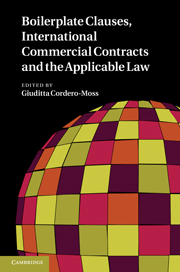Book contents
- Frontmatter
- Contents
- List of contributors
- Preface
- Introduction
- PART 1 How contracts are written in practice
- PART 2 Methodological challenges
- PART 3 The applicable law's effects on boilerplate clauses
- Introduction to Part 3
- 7 The common law tradition: application of boilerplate clauses under English law
- 8 The Germanic tradition: application of boilerplate clauses under German law
- 9 The Romanistic tradition: application of boilerplate clauses under French law
- 10 The Romanistic tradition: application of boilerplate clauses under Italian law
- 11 The Nordic tradition: application of boilerplate clauses under Danish law
- 12 The Nordic tradition: application of boilerplate clauses under Finnish Law
- 13 The Nordic tradition: application of boilerplate clauses under Norwegian law
- 14 The Nordic tradition: application of boilerplate clauses under Swedish law
- 15 The East European tradition: application of boilerplate clauses under Hungarian law
- 16 The East European tradition: application of boilerplate clauses under Russian law
- Conclusion: the self-sufficient contract, uniformly interpreted on the basis of its own terms: an illusion, but not fully useless
- Bibliography
- Index
- References
8 - The Germanic tradition: application of boilerplate clauses under German law
from PART 3 - The applicable law's effects on boilerplate clauses
Published online by Cambridge University Press: 11 April 2011
- Frontmatter
- Contents
- List of contributors
- Preface
- Introduction
- PART 1 How contracts are written in practice
- PART 2 Methodological challenges
- PART 3 The applicable law's effects on boilerplate clauses
- Introduction to Part 3
- 7 The common law tradition: application of boilerplate clauses under English law
- 8 The Germanic tradition: application of boilerplate clauses under German law
- 9 The Romanistic tradition: application of boilerplate clauses under French law
- 10 The Romanistic tradition: application of boilerplate clauses under Italian law
- 11 The Nordic tradition: application of boilerplate clauses under Danish law
- 12 The Nordic tradition: application of boilerplate clauses under Finnish Law
- 13 The Nordic tradition: application of boilerplate clauses under Norwegian law
- 14 The Nordic tradition: application of boilerplate clauses under Swedish law
- 15 The East European tradition: application of boilerplate clauses under Hungarian law
- 16 The East European tradition: application of boilerplate clauses under Russian law
- Conclusion: the self-sufficient contract, uniformly interpreted on the basis of its own terms: an illusion, but not fully useless
- Bibliography
- Index
- References
Summary
Introduction
Germany was the world champion of exports for a few years. The economic transactions leading to that result are all based on contracts which possess an international element. Many if not most of these contracts are drafted in English and use common law terminology. Some typical contract clauses stem specifically from the United States. Even between German merchants, contracts that are completely in English are not unfamiliar. However, international contracts other than sales or distribution contracts are frequently written in English, the modern lingua franca. This is particularly true for international construction contracts which are often based on the FIDIC (Fédération International des Ingénieurs-Conseils) contract form. It is thus not rare that German courts – and particularly arbitration tribunals – have to deal with such contracts. A specific problem that can arise in the construction of these contracts is the possible discrepancy between the common law style of the language of the contract and the applicable contract law that, in these cases, will often be German law. To exaggerate only slightly, there may be a ‘clash of legal cultures’.
This specific kind of tension between the terms of a contract and a different applicable law has been the subject of some debate in Germany in recent years. Nonetheless, the general phenomenon that parties act on a legal basis different from the applicable law has long since been well known in German private international law. It is termed ‘Handeln unter falschem/fremdem Recht’ (acting under wrong/foreign law).
- Type
- Chapter
- Information
- Publisher: Cambridge University PressPrint publication year: 2011
References
- 1
- Cited by

